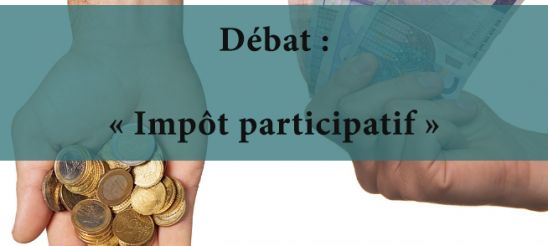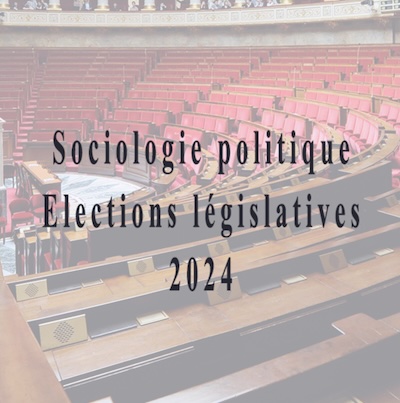Interview de Béatrice Cherrier pour Les Echos (23.09/2024)
Pourquoi les économistes se trompent-ils (quasiment) tout le temps ?
Interview de Béatrice Cherrier pour Les Echos (23.09/2024)
Béatrice Cherrier, invitée du Magazine du weekend sur France Culture.
Samedi 24 août 2024
Béatrice Cherrier, invitée du Magazine du weekend sur France Culture.
Samedi 24 août 2024
Une interview de Pierre Boyer pour le Journal La Croix.
21/08/2024
Une interview de Pierre Boyer pour le Journal La Croix.
21/08/2024
Une tribune de Pierre Rousseaux pour le journal Les Échos
Publiée le 7 août 2024
Une tribune de Pierre Rousseaux pour le journal Les Échos
Publiée le 7 août 2024
Dissolution de l’Assemblée nationale et nouveau paysage politique : Etienne Ollion dans les médias
Etienne Ollion, sociologue et directeur de recherche au CNRS et professeur à l’Ecole polytechnique est spécialiste de sociologie politique. En 2017, Etienne Ollion mène une longue enquête à l’Assemblée nationale afin d’étudier la place des novices sous la présidence d’Emmanuel Macron, qui fera l’objet de son ouvrage publié aux éditions PUF, Les Candidats. Novices et professionnels en politique (2021).
En juin 2024, à la suite des résultats aux élections européennes, le président Emmanuel Macron a annoncé la dissolution de l’Assemblée nationale. Cette décision intervient après une victoire significative du Rassemblement National (RN) aux élections européennes, où le parti a obtenu 31,5 % des voix, devançant la liste de la majorité présidentielle (14,5 %).
La dissolution de l’Assemblée nationale entraîne la suspension immédiate de tous les travaux parlementaires en cours, y compris des projets de loi importants. De nouvelles élections législatives sont prévues les 30 juin et 7 juillet 2024. Ce type de dissolution est rare, la dernière remontant à 1997 sous Jacques Chirac.
Etienne Ollion, ayant largement étudié, la composition de l’assemblée, son fonctionnement, et plus récemment la situation en italienne avec l’arrivée au pouvoir de Giorgia Meloni, a été interviewé par de nombreux médias.
Emma Bonutti d’Agostini, doctorante en première année sous la supervision d’Etienne Ollion, s’intéresse à la circulation du discours et de l’idéologie de l’extrême droite dans les sphères journalistiques et médiatiques en France et en Italie. Elle a également été sollicité sur ses travaux par le journal Le Pèlerin : https://www.lepelerin.com/monde/decryptage/quel-est-le-bilan-pour-les-5-pays-d-europe-dans-lesquels-l-extreme-droite-gouverne-9867
Presse écrite
L’Express :
03/07/2024
https://www.lexpress.fr/idees-et-debats/etienne-ollion-bardella-au-pouvoir-pourrait-avoir-un-impact-bien-plus-fort-que-meloni-en-italie-XBQVX6R7PJDD7ITJZP55QIGPXM/?utm_medium=Social&utm_source=Twitter#Echobox=1720002052
L’Echo :
29/06/24
https://www.lecho.be/opinions/general/etienne-ollion-en-cas-de-victoire-du-rn-en-france-le-chef-serait-le-premier-ministre-et-non-le-president/10553529.html
AOC Media :
23/06/24
https://aoc.media/opinion/2024/06/23/le-mythe-de-limmunite-des-democraties-a-lautoritarisme/
La Nouvelle République :
23/06/2024
https://www.lanouvellerepublique.fr/a-la-une/l-arrivee-au-pouvoir-de-bardella-aurait-un-impact-plus-fort-que-celle-de-meloni-en-italie
Nice-Matin :
23/06/2024
https://www.pressreader.com/france/nice-matin-menton/20240623/282102051853070
Le Télégramme :
Le 23/06/24 :
https://www.letelegramme.fr/france/peut-on-comparer-giorgia-meloni-en-italie-et-jordan-bardella-en-france-6610523.php
06/07/24
https://www.letelegramme.fr/elections/legislatives/dans-une-coalition-ce-nest-pas-toujours-le-parti-du-milieu-qui-gouverne-6620952.php
France Infos :
03/07/24
https://www.francetvinfo.fr/elections/legislatives/legislatives-2024-comment-la-figure-de-jean-luc-melenchon-est-devenue-plus-repoussoir-que-celle-de-marine-le-pen_6639738.html
Le Nouvel Obs :
3/07/24
https://www.nouvelobs.com/idees/20240703.OBS90607/a-l-assemblee-des-deputes-lfi-anti-republicains-ou-ultra-republicains.html
9/07/24
https://www.nouvelobs.com/politique/20240709.OBS90886/legislatives-le-sursaut-et-l-inconnu.html
10/07/24
https://www.nouvelobs.com/politique/20240710.OBS90972/l-immense-majorite-des-pays-europeens-a-un-gouvernement-de-coalition-la-france-constitue-une-exception.html
Podcasts :
France Culture :
1/07/24
https://www.radiofrance.fr/franceculture/podcasts/france-culture-va-plus-loin-l-invite-e-des-matins/apres-le-premier-tour-des-elections-legislatives-la-resurrection-d-un-front-republicain-1520144
Vidéos :
Regards #LaMidinale :
21 juin 2024
https://regards.fr/sans-majorite-macron-pourrait-nommer-un-premier-ministre-entoure-par-un-gouvernement-technique/
Mediapart _ Soirées électorales :
Le 30/06/24 :
https://www.mediapart.fr/journal/politique/300624/legislatives-la-soiree-electorale-en-direct#at_medium=custom7&at_campaign=1047
Le 7/07/24 :
https://www.mediapart.fr/journal/politique/050724/dimanche-7-juillet-19-h-30-la-soiree-electorale-en-direct-sur-mediapart
Dissolution de l’Assemblée nationale et nouveau paysage politique : Etienne Ollion dans les médias
Etienne Ollion, sociologue et directeur de recherche au CNRS et professeur à l’Ecole polytechnique est spécialiste de sociologie politique. En 2017, Etienne Ollion mène une longue enquête à l’Assemblée nationale afin d’étudier la place des novices sous la présidence d’Emmanuel Macron, qui fera l’objet de son ouvrage publié aux éditions PUF, Les Candidats. Novices et professionnels en politique (2021).
En juin 2024, à la suite des résultats aux élections européennes, le président Emmanuel Macron a annoncé la dissolution de l’Assemblée nationale. Cette décision intervient après une victoire significative du Rassemblement National (RN) aux élections européennes, où le parti a obtenu 31,5 % des voix, devançant la liste de la majorité présidentielle (14,5 %).
La dissolution de l’Assemblée nationale entraîne la suspension immédiate de tous les travaux parlementaires en cours, y compris des projets de loi importants. De nouvelles élections législatives sont prévues les 30 juin et 7 juillet 2024. Ce type de dissolution est rare, la dernière remontant à 1997 sous Jacques Chirac.
Etienne Ollion, ayant largement étudié, la composition de l’assemblée, son fonctionnement, et plus récemment la situation en italienne avec l’arrivée au pouvoir de Giorgia Meloni, a été interviewé par de nombreux médias.
Emma Bonutti d’Agostini, doctorante en première année sous la supervision d’Etienne Ollion, s’intéresse à la circulation du discours et de l’idéologie de l’extrême droite dans les sphères journalistiques et médiatiques en France et en Italie. Elle a également été sollicité sur ses travaux par le journal Le Pèlerin : https://www.lepelerin.com/monde/decryptage/quel-est-le-bilan-pour-les-5-pays-d-europe-dans-lesquels-l-extreme-droite-gouverne-9867
Presse écrite
L’Express :
03/07/2024
https://www.lexpress.fr/idees-et-debats/etienne-ollion-bardella-au-pouvoir-pourrait-avoir-un-impact-bien-plus-fort-que-meloni-en-italie-XBQVX6R7PJDD7ITJZP55QIGPXM/?utm_medium=Social&utm_source=Twitter#Echobox=1720002052
L’Echo :
29/06/24
https://www.lecho.be/opinions/general/etienne-ollion-en-cas-de-victoire-du-rn-en-france-le-chef-serait-le-premier-ministre-et-non-le-president/10553529.html
AOC Media :
23/06/24
https://aoc.media/opinion/2024/06/23/le-mythe-de-limmunite-des-democraties-a-lautoritarisme/
La Nouvelle République :
23/06/2024
https://www.lanouvellerepublique.fr/a-la-une/l-arrivee-au-pouvoir-de-bardella-aurait-un-impact-plus-fort-que-celle-de-meloni-en-italie
Nice-Matin :
23/06/2024
https://www.pressreader.com/france/nice-matin-menton/20240623/282102051853070
Le Télégramme :
Le 23/06/24 :
https://www.letelegramme.fr/france/peut-on-comparer-giorgia-meloni-en-italie-et-jordan-bardella-en-france-6610523.php
06/07/24
https://www.letelegramme.fr/elections/legislatives/dans-une-coalition-ce-nest-pas-toujours-le-parti-du-milieu-qui-gouverne-6620952.php
France Infos :
03/07/24
https://www.francetvinfo.fr/elections/legislatives/legislatives-2024-comment-la-figure-de-jean-luc-melenchon-est-devenue-plus-repoussoir-que-celle-de-marine-le-pen_6639738.html
Le Nouvel Obs :
3/07/24
https://www.nouvelobs.com/idees/20240703.OBS90607/a-l-assemblee-des-deputes-lfi-anti-republicains-ou-ultra-republicains.html
9/07/24
https://www.nouvelobs.com/politique/20240709.OBS90886/legislatives-le-sursaut-et-l-inconnu.html
10/07/24
https://www.nouvelobs.com/politique/20240710.OBS90972/l-immense-majorite-des-pays-europeens-a-un-gouvernement-de-coalition-la-france-constitue-une-exception.html
Podcasts :
France Culture :
1/07/24
https://www.radiofrance.fr/franceculture/podcasts/france-culture-va-plus-loin-l-invite-e-des-matins/apres-le-premier-tour-des-elections-legislatives-la-resurrection-d-un-front-republicain-1520144
Vidéos :
Regards #LaMidinale :
21 juin 2024
https://regards.fr/sans-majorite-macron-pourrait-nommer-un-premier-ministre-entoure-par-un-gouvernement-technique/
Mediapart _ Soirées électorales :
Le 30/06/24 :
https://www.mediapart.fr/journal/politique/300624/legislatives-la-soiree-electorale-en-direct#at_medium=custom7&at_campaign=1047
Le 7/07/24 :
https://www.mediapart.fr/journal/politique/050724/dimanche-7-juillet-19-h-30-la-soiree-electorale-en-direct-sur-mediapart










